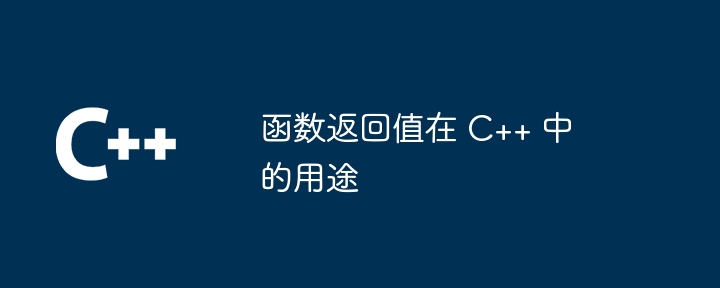Home >Backend Development >C++ >The purpose of function return value in C++
The purpose of function return value in C++
- 王林Original
- 2024-04-30 18:09:011247browse
In C, a function can return a value through the return keyword, which can be any data type, including numeric values and objects. The return value is used to pass information or calculation results to the caller, and can be used to check errors, optimize performance, and implement the single responsibility principle.

The purpose of function return value in C
In C, a function can return a value through the return keyword. Return values can be used to pass calculation results or information to the caller.
Data type
The function return value can be any data type, including Boolean values, characters, integers, floating point numbers, and custom objects.
Syntax
The syntax of function return value is as follows:
<return_type> function_name(...) {
// 函数体
return value;
}Where:
-
3081bc6c542a4be2b6e2eca3709ff4f5is a function The type returned. -
function_nameis the name of the function. -
(...)is the parameter list of the function (optional). -
valueis the value returned by the function.
Practical case
Consider the following function that calculates area:
double calculate_area(double base, double height) {
return base * height / 2;
}This function has two double-precision floating point parameters: base and height. It returns half the product of these two arguments.
In the main function, we can use this function to calculate the area of the triangle:
int main() {
double base = 5.0;
double height = 10.0;
double area = calculate_area(base, height);
cout << "三角形的面积为:" << area << endl;
return 0;
}The output is as follows:
三角形的面积为:25
Other uses
In addition to passing calculation results, function return values can also be used for:
- Checking for errors: Functions can indicate errors by returning an error code or error object.
- Optimize performance: avoid recalculation by returning value.
- Implement the single responsibility principle: a function should only be responsible for one task, so return values can help ensure this.
The above is the detailed content of The purpose of function return value in C++. For more information, please follow other related articles on the PHP Chinese website!

